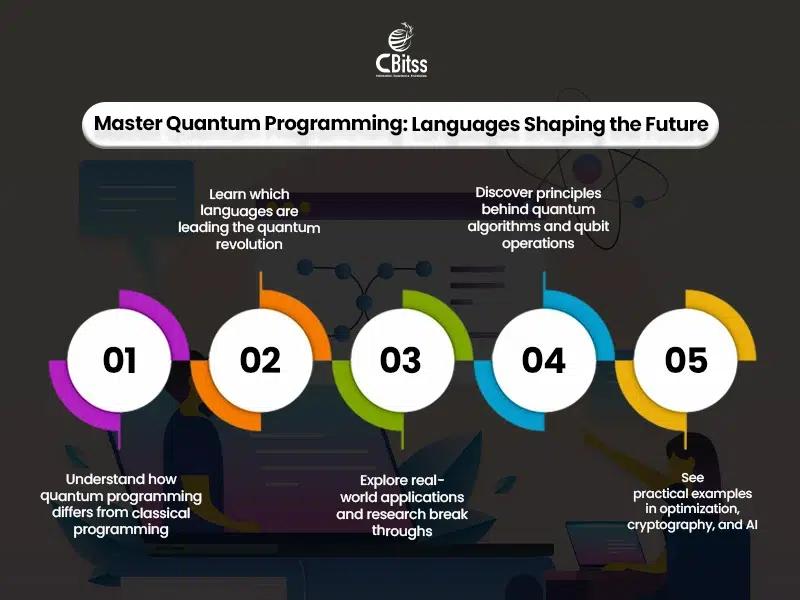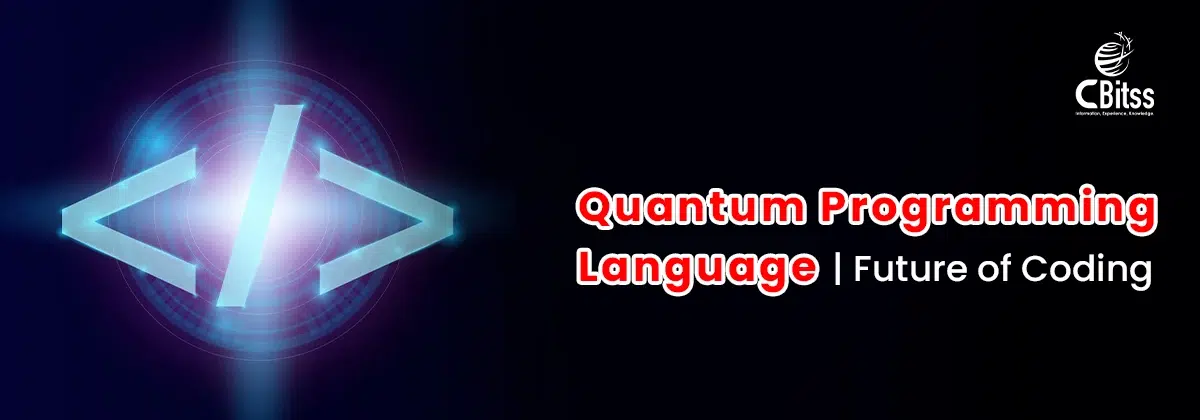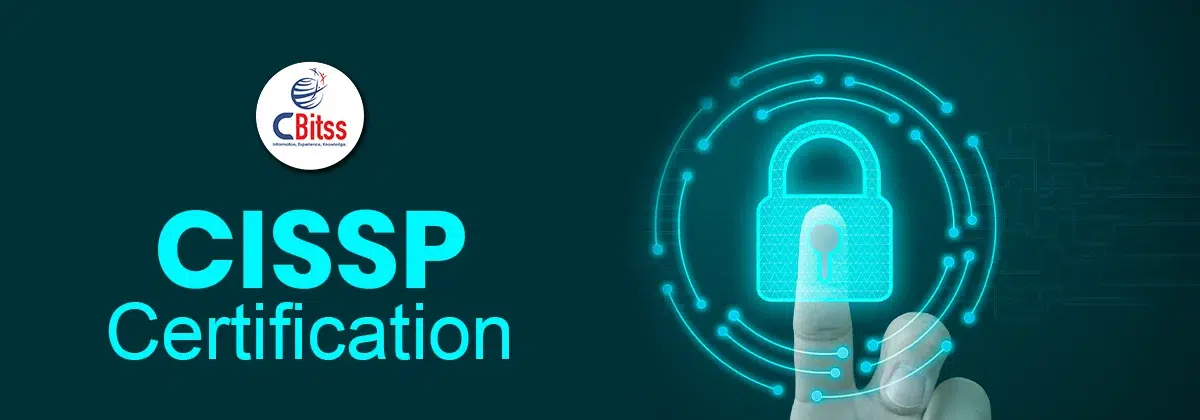Table of Contents
ToggleIntroduction
Quantum computing is not only a futuristic idea, but it is also changing the manner in which we compute. Certainly, Quantum Programming Language | Future of Coding reflects on the way in which quantum mechanics can be used by developers to address problems that classical computers are incapable of solving.
But certainly, what is a programming language that is appropriate to quantum computing, and how do you learn it nowadays? This article surely takes you through the developing languages, real-life applications, and the latest research. At the conclusion, you will have an idea which programming language is used for quantum computing, its importance, and the future of the world of coding with quantum programming.
If you’re curious about what is Python, explore its features and advantages among popular programming languages.
Why Quantum Programming Matters
Above all, Quantum computing must bring totally new approaches to the thinking about algorithms and computation. In contrast to classical programming, quantum programming utilizes the qubits, the concept of superposition, and entanglement. Knowledge of what programming languages are used in quantum computing is necessary to allow developers to venture into optimization problems, cryptography, or complex system simulations.
- Quantum computing programming language has the possibility of operating directly with the qubits and quantum gates.
- The Quantum Programming Language | Future of Coding has abstractions that are easier to construct with circuits.
- The fact that the best programming language for quantum computing can radically speed up learning and experimentation can be considered emancipatory.
- The value of what programming language do quantum computers use is that they enable researchers to design and test quantum algorithms.
- A background on what programming language is used in quantum computing will provide an idea of how both hardware and software constraints interrelate.
Before you start, check out the essential things you need to know before learning Python to build a strong foundation.

Core Quantum Programming Languages
Most of these programming languages prevailing in our modern day are created to make the complicated mathematics of qubits easier to understand.
- Qiskit (written in Python) is a framework that enables its users to design and run circuits on IBM qubits.
- Q# by Microsoft is an open source, full-capability quantum computing programming language that can be used in hybrid applications, built on .NET.
- Google has created Cirq, which is a tool to write, simulate, and optimize circuits for near-term quantum devices.
- Quipper has scalable implementations of complex quantum algorithms in research applications.
- q quantum programming language is a logic programming language that focuses on high-level operations on logical qubits that have simplified syntax.
Discover what is Python programming and how it powers modern software development.
Step into the next era of programming innovation today.
Principles Behind Quantum Language Design
The knowledge of what programming languages are used in quantum computing is incomplete without understanding the principles that underlie it. Quantum languages are required to support parallelism (as part of qubits), reversible computation, and probabilistic results as opposed to classical programming. The syntax and style vary, yet each language has constructs of gates, measurements, and control flow. What programming language is used in quantum computing may vary depending on what hardware targets being targeted and what algorithm being executed.
Key principles include:
- Quantum gate encapsulation into functions that can be reused.
- Hybrid computing with classical host languages.
- Simulation on the classical machines before running it on the quantum hardware it is supported.
- Error correction and noise-reducing tools of real devices.
Take your skills to the next level with advanced Python programming classes in Chandigarh.
Selecting the Best Language for Your Project
The top programming language for quantum computing is based on your objectives. Python-based frameworks such as Qiskit or Cirq are popular with beginners due to the support and very rich documentation. Even more advanced researchers may consider using Q# or Quipper to develop algorithms on a larger scale.
- Understand the different types of directory submission used in SEO to strengthen your backlink profile.
- Take into account platform compatibility: IBM, Microsoft, and Google are all biased towards various ecosystems.
- Simulators Local testing of quantum circuits can be evaluated using available simulators.
- It can be either libraries of quantum machine learning, optimization, or cryptography.
- Seek a good community support and tutorials to hasten the learning.
- Balance abstraction level with control: friendly languages that are easy to understand can be used to conceal the hardware.
Learn more about Android Instant Apps and how they enhance user experiences on mobile devices.
Learning Quantum Programming Quickly
The steepness of the learning curve what programming language is used in quantum computing may be steep, but with structured practice, it can be rapidly learned. The developers should have the knowledge about the principles of quantum mechanics to integrate the classical programming knowledge.
- Start with simple qubit circuits and gates with q quantum programming language.
- Simulation in Qisket or Cirq: This step is done to simulate algorithms to visualize superposition and entanglement.
- The basic quantum algorithms, such as Grover search or Shor factorization, can be used to solve real-world problems.
- Research quantum computers on the cloud to run code on physical hardware, and implement these languages.
- Reading research papers and tutorials on a brief survey of quantum programming languages
Explore the best PPC ad networks to maximize your online advertising campaigns.
Get certified training that makes your resume stand out instantly.
Advantages of Quantum Programming
The field of quantum programming is changing the world with its solutions that classical computers cannot perform with great efficiency. Developers who master these languages can get access to optimization, simulation, and cryptographic tools whose value will be the future of computing.
- Optimization and search problems can be optimized faster.
- Pharmaceuticals and materials science: Molecular structure simulation.
- Improved crypto-procedures based on quantum principles.
- Superposition scaling of hardware without parallel processing.
- AI quantum-enhanced machine learning.
Discover practical ways to make money online using digital platforms and smart strategies.
Challenges in Quantum Programming
Despite the rapid development, developers face challenges in how to use quantum programming languages. Hardware limitations, noise, and restricted qubit numbers should be planned for. Not all algorithms are useful in quantum execution, and quantum circuit debugging is not similar to classical debugging. Knowing what programming language do quantum computers use can be used to predict constraints and select the appropriate framework.
- Controlling errors and decoherence of real quantum systems.
- Translating classical algorithms into quantum equivalents
- Maximizing depth and gate efficiency.
- The dilemma of the simulator versus the real hardware.
- Browsing through scanty documentation of state-of-the-art languages.
Understand how AdWords call-only campaigns can boost your local business outreach.
Future Outlook for Quantum Programming
The future development of quantum computing programming languages is progressing rapidly. New frameworks and languages will be developed to make quantum hardware more accessible, facilitate the combination of AI, and enable hybrid classical-quantum architectures. Early implementers using the best programming language for quantum computing are scaling out of laboratories and into commercial use.
- It is predicted that cloud-based quantum development platforms will go mainstream.
- The interoperability of language will also be enhanced, and cross-platform code writing will become possible.
- Libraries will grow in size in terms of quantum machine learning, optimization, and cryptography.
- It will allow easier programming by non-physicists due to hardware abstraction.
- There will be education and tutorials that will help lessen barriers to entry.
Learn effective methods to brand your business and stand out from the competition.

Conclusion
Quantum Programming Language | Future of Coding represents a paradigm shift in
software development. By knowing what programming language do quantum computers
use, developers can explore powerful algorithms previously impossible on classical systems. Tools like q quantum programming language, Qiskit, Cirq, and Q# enable experimentation and application of real quantum devices.
By learning what programming languages are used in quantum computing, which programming language is used for quantum computing, and the best programming language for quantum computing, you prepare for a future where quantum computation is mainstream. A solid foundation and hands-on experience make it possible to innovate faster, solve complex problems, and shape the next era of computing.
Dive into marketing automation and streamline your business marketing efforts.
Step into the future of coding today. Introduce yourself to Quantum Programming Language | Future of Coding and begin experimenting with qubits, as well as create your first circuit.
Grasp the art of mastering it with a brief survey of quantum programming languages that will enable one to tackle even more problems smartly and more quickly in the future.
Quantum revolution is here to stay; do not be left out.
Explore top email marketing platforms to improve your communication and conversions.

Sukhamrit Kaur
Sukhamrit Kaur is an SEO writer who loves simplifying complex topics. She has helped companies like Data World, DataCamp, and Rask AI create engaging and informative content for their audiences. You can connect with her on LinkedIn.







